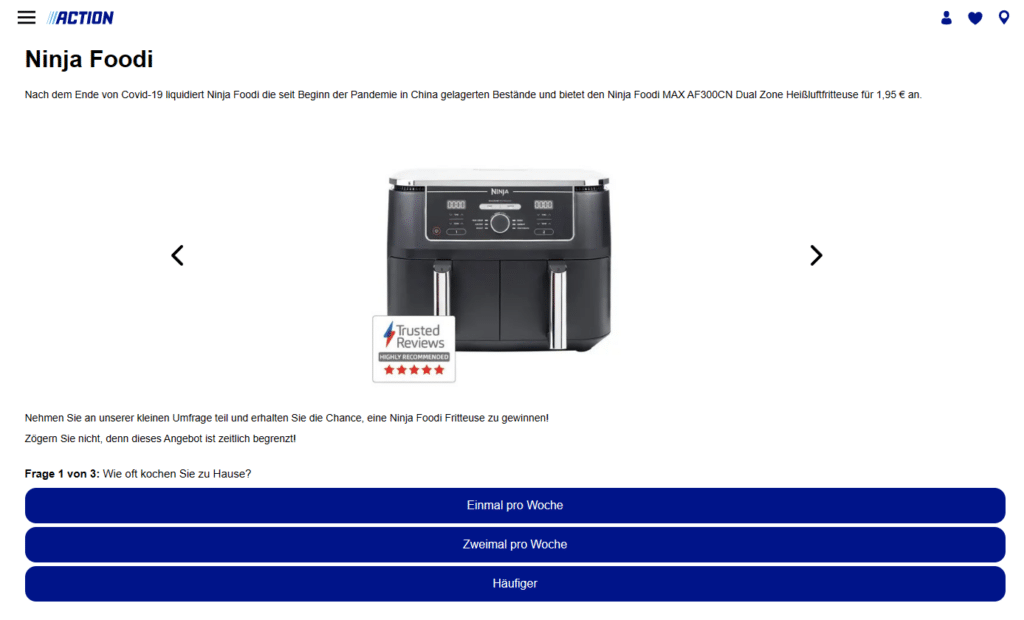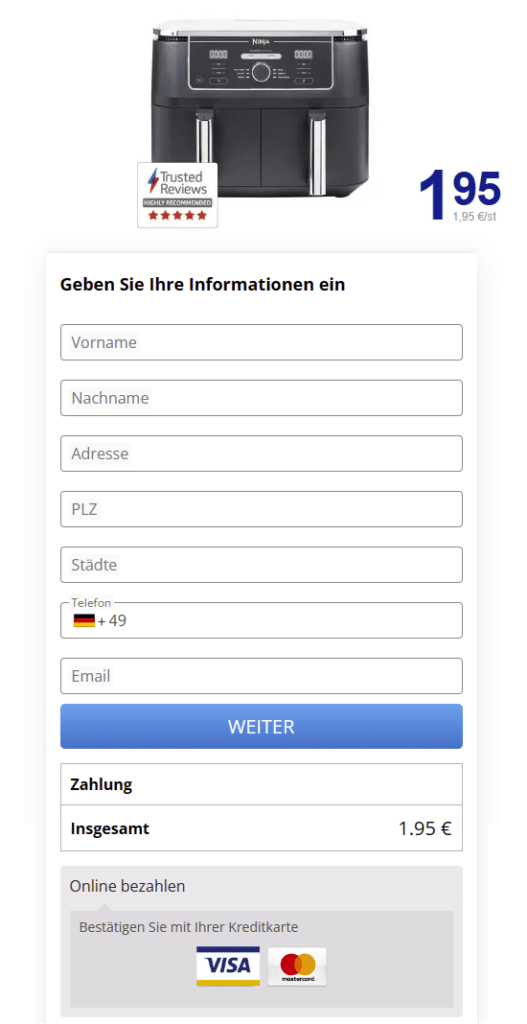In the vastness of the Internet, offers appear again and again that seem too good to be true. A current example is the advertisement by a page called “Action Liquidationslager” on Facebook, which offers the “Ninja Foodi Air Fryer” for just 1.95 euros. The stated reason for this ridiculous price is slight damage to the boxes of the devices.

But what appears at first glance to be an unbeatable offer turns out, upon closer inspection, to be a well-known scam with the aim of extorting sensitive data from unsuspecting users.
The scam behind the Ninja Foodi Air Fryer bargain
The strategy is not new, but it is still shockingly effective: consumers are lured with a lure offer that is offered at a price well below market value. In this case, the “Ninja Foodi Air Fryer” is advertised at a price that realistically cannot cover costs. The reason for the low price - slight damage to the box - may sound plausible to some people, but the actual intention behind the offer is completely different.
The real goal: data collection
Instead of a cheap air fryer, buyers can expect a trap. In order to get the supposed bargain, you are asked to visit a website where you first have to answer a few simple questions.

Once you have completed this, you will be congratulated on your “win”.

To receive your air fryer, you will now be asked to enter your personal information.

This often includes not only your name and address, but also - as here - credit card details in order to pay the minimum amount. But instead of an air fryer, at best you get nothing - at worst you open the door to fraudsters.
This collected data is often passed on to third parties, leads to unwanted subscriptions or to your device being infected with malware. The consequences can range from unwanted advertising calls to serious financial damage.
Protection against fraud: tips and advice
To protect yourself from such fraud attempts, skepticism is the first rule. Offers that seem too good to be true should always be questioned. It is advisable to check the reliability of the provider before making a purchase and, if in doubt, to refrain from purchasing. Furthermore, you should never prematurely reveal personal information on the Internet, especially on sites whose trustworthiness is not certain.
questions and answers
Question 1: How do you recognize dubious offers on the Internet?
Answer 1: You can often recognize dubious offers by unrealistically low prices, a lack of legal information on the website or by the request to enter sensitive data on dubious websites.
Question 2: What should you do if you come across such an offer?
Answer 2: Ignore the offer and do not enter any personal information. If necessary, report such sites to the operators of the platform on which the advertisement appeared.
Question 3: How can you generally protect yourself from fraud on the Internet?
Answer 3: Be skeptical about offers that are too good, check the reliability of the providers and avoid unnecessarily disclosing personal data on the Internet.
Question 4: What happens to the data given to fraudsters?
Answer 4: The data may be used for further fraud attempts, to take out unwanted subscriptions, to share it with third parties, or to distribute malware.
Question 5: What to do if you have already fallen into such a trap?
Answer 5: Inform your bank, change affected passwords and monitor your account transactions closely. In the case of malware, a virus scan should also be carried out.
Conclusion
The lure offers on the Internet, such as the example of the “Ninja Foodi Air Fryer” for 1.95 euros, are a classic scam. They aim to lure consumers with unbeatable prices and then collect their personal information. The danger posed by such offers should not be underestimated.
It is important to remain vigilant, to critically question offers and, if in doubt, to avoid purchasing. Regularly find out about new fraud methods and actively protect yourself against data theft and malware.
Take advantage of the opportunity to sign up for the Mimikama newsletter and find out about our online lectures and workshops . Stay informed, stay safe.
You might also be interested in:
Disney+: Digital theft – how to protect yourself from it
Recognizing and avoiding phishing attacks: A comprehensive guide
Facebook: “Safety & detection” – False security warnings
Notes:
1) This content reflects the current state of affairs at the time of publication. The reproduction of individual images, screenshots, embeds or video sequences serves to discuss the topic. 2) Individual contributions were created through the use of machine assistance and were carefully checked by the Mimikama editorial team before publication. ( Reason )

